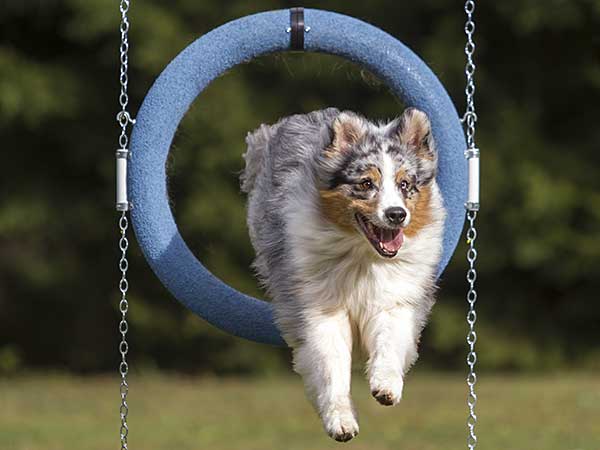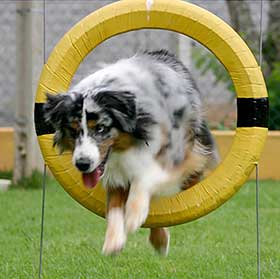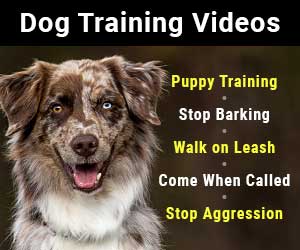
Agility Tire Jump Provides Great Physical And Mental Exercise
The tire jump is probably the most common and most recognizable piece of agility equipment. As its names suggests, it is a jump that consists of a frame with a hoop, or "tire", suspended inside it through which the dog is required to jump cleanly. Though it is called a tire jump, the hoop in the jump is not an actual tire and has a larger interior diameter than most tires, making it easier for even large dogs to clear it cleanly.
Every one of the organizations that govern agility competitions includes jumps in their courses. As a matter of fact, jumps tend to make up at least half of every agility course. For this reason, it is imperative that all kinds of jumps, including tire, bar, wing and panel, are a part of any agility training regimen but particularly if your ultimate goal is to perform in competition.
You can purchase jumps in various sizes, but current agility safety standards necessitate any tire jump to have an opening between 19-24". This can accommodate most breeds and will help to minimize injury. The AKC and CPE use a 24" tire in competition, while the USDAA uses a 20" tire. The size of the opening you use will depend on your dog, although it is highly recommended that you get him used to the competition standard as early as possible.
Frames can be made from plastic piping, such as PVC, or from lightweight metal. This makes them easy to move or disassemble for transport. For the tires themselves, safety is key. As with any jump, since there is a possibility of your dog making contact with the jump it is important that it be made of a light material with some give so that it won't cause injury.

Sabine Glässl / stock.adobe.com
At the competition level, flat hoops with magnetic attachments at the bottom are used. These allow for the hoop to come apart easily on impact and to reattach itself without the need for manual intervention.
Progressing From Bar Jump To Tire Jump
When training your dog on jumps, it is usually easier to begin with the more standard bar jumps before moving up to a tire or "hoop jump." You'll find that the act of jumping itself is usually not a challenge as most dogs love to jump, which is why they tend to jump up onto furniture when you don't want them to! The key to competition jumping is getting the dog used to your commands and of course completing the jump quickly and cleanly.
Getting your dog used to jumping and following commands is the first step, then you can progress to concentrating on speed and accuracy. Once your dog gets the hang of a standard jump, you can move on to the tire, which presents its own unique challenge as it requires the dog to jump through an object rather than just over it. For training purposes it may be a good idea to start with a tire that has a larger size opening before moving down to the regulation competition size.
With both the standard jump and tire jump in his repertoire, your dog will be able to handle almost any competition course. Just remember that it is important for him to eventually take on the various jumps in combination in order to be prepared for the challenge of competition.
No matter the size or shape of your dog, jumping can be a great physical and mental exercise. So if you're interested in agility training, make sure a tire or "agility ring" is part of your equipment!
More Agility Tire Jump Training Tips

Vanessa Fermino
Australian Shepherd Goomba
While training for the tire jump is similar to other jumps there are some differences.
Jumping through a fairly small opening can be intimidating for some dogs. So start slow and start low. In fact move the tire right to the ground when you are just beginning. Let your dog get used to the idea of going through first.
Gently guide them through the opening and when they do praise them enthusiastically, give them a treat or use your clicker. The important thing is to let your dog know what you expect from them.
Once they are comfortable and confident with going through the tire at ground level raise it up a bit, not much, just a bit. You don't want to raise it too fast or your dog will likely just start running under the tire instead of through it. If this happens you will have to lower it again maybe even back to the ground and start over.
Slowly but surely you will reach your target height. They will eventually sail through the air and will learn exactly how to clear the tire. Once your dog has reached this level don't lower the jumping height back down again.
This is because your dog has developed a sense of what she needs to do to get through the tire and now has "muscle memory" tuned to the task. If you drop the height your dog may not realize what you've done until it's too late and could be injured.
Be consistent with your use of command words. Words like "tire", "hoop", or "through" make the most sense. Whichever word you choose, stick with it but don't introduce the command word until they are comfortable with the tire jump. This goes for other agility obstacles as well.
This is because you don't want your dog to associate the command word with something that they are afraid of or leery about doing. Wait until they are enjoying the obstacle and create a happy association instead.
United States Dog Agility Association, Inc. (USDAA)
Have Dog Training Questions?
Check out these introductory dog training videos...
I want my dog to stop being aggressive.
I want some help training my new puppy.
I want my dog to stop barking at everything.
Get Australian Shepherd Info, Website Updates, Special Offers, and Cartoons...
FREE GIFT
You'll also receive a free copy of the ebook
My Everyday Dog Training Tools
by professional dog trainer Daniel Abdelnoor, "Doggy Dan"











